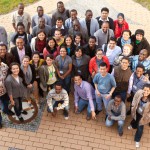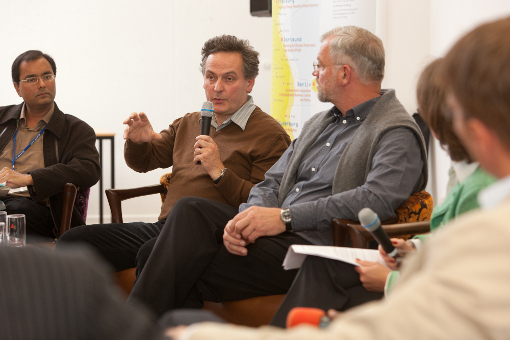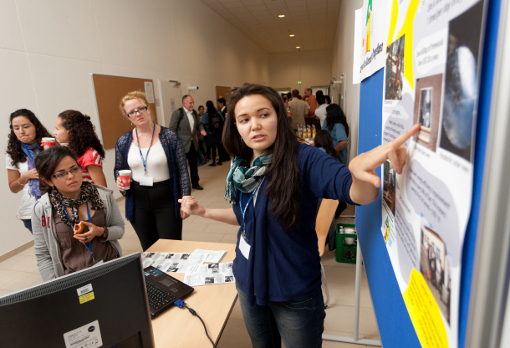Business Meets Science – Promising projects on display at the Flensburg workshops
 Everyone knows: global energy consumption is depleting our forests, polluting the environment and simply cannot continue at this pace. The purpose of the “Millennium Express” event, held in the city of Flensburg in northern Germany, was to strengthen the common resolve to overcome these challenges and gather fresh new ideas for sustainable energy management around the world. DAAD scholarship holders pursuing a degree in “Energy and Environmental Management in Developing Countries” invited scientists and members of the business community to work together on finding concrete solutions.
Everyone knows: global energy consumption is depleting our forests, polluting the environment and simply cannot continue at this pace. The purpose of the “Millennium Express” event, held in the city of Flensburg in northern Germany, was to strengthen the common resolve to overcome these challenges and gather fresh new ideas for sustainable energy management around the world. DAAD scholarship holders pursuing a degree in “Energy and Environmental Management in Developing Countries” invited scientists and members of the business community to work together on finding concrete solutions.
“Believe in yourself, trust yourself, be stubborn and go your own way” – this was the message from businessman Marius Bierig to some 50 young students from developing and threshold countries, who had come together in Flensburg for the workshop. Bierig, an engineer by training, enthralled the students with the story of his own career, his mud housing construction company, and the company’s strong commitment to energy efficiency. For DAAD fellow Mayra Herrena from El Salvador, hearing about the ups and downs of Bierig’s experience in business was a source of inspiration and renewed focus: “He helped strengthen my resolve and I know now that I can realise my ideas,” said Herrena, who is enrolled at the Karlsruhe Institute of Technology.
A turnaround in energy
Many in attendance were also inspired by the words of Professor Olav Hohmeyer, director of the DAAD-sponsored degree programme Energy and Environmental Management at the University of Flensburg. Hohmeyer argued that Germany can meet its entire energy demand with renewable energy supplies. This drew the attention of Wiriyapak Ratanaprasitt from Thailand, who is studying Agricultural Economics at the Universität Hohenheim.
“In Thailand today, the big topic is biomass as an energy resource and how to move away from coal,” said Ratanaprasitt. “There is a lot of debate about how to integrate biomass in a way that is efficient and cost effective” – a debate which she looks forward to participating in after completing her postgraduate degree. For Ratanaprasitt, Hohmeyer’s presentation was a good example of effective argumentation and a provided valuable input on how to achieve the switch to renewable energies.
Creative business ideas
Workshop organisers introduced a competition as a way to stimulate a creative and lively exchange of ideas among the participants. Who had the best business ideas in the area renewable energies? Four groups presented projects which they are currently implementing in their respective home countries. The projects are mainly focused on solutions to energy challenges in the poor rural areas of developing countries: a small lamp powered by solar cells as a replacement for the gas lamp, a manual for building a simple and inexpensive solar cooker, a water pump powered by solar energy, or a small biogas system that can fuel a cooking stove with dung from two cows.
Turning dreams into action
DAAD scholarship holder Nafisa Fayzullaeva from Uzbekistan is convinced that “no one just starts using something new out of the blue.” This is why Fayzullaeva travels to villages to personally demonstrate the renewable energy systems developed as part of her project. “We take students into villages, schools, to local companies and non-governmental organisations. We show them on the practical level how to build a solar cooker themselves with the simplest of materials.” Fayzullaeva wants these kinds of new alternatives to replace firewood as the standard cooking fuel. She emphasises that “this is not just some dream” and backs it up with some figures: using the solar cooker once a day can save 600 kilograms of valuable wood over the course of the year. The Uzbekistan native is currently enrolled in the International Development Economics degree programme at the University of Applied Sciences (HTW) in Berlin.
David Kigima is also betting on solar energy. Currently enrolled in the Renewable Energy degree programme at the University of Oldenburg, Kigima presented an irrigation system for greenhouses powered by the sun. The investment required can be shared by several farmers and pays off in the long term: “And besides, we have a responsibility to the next generation,” he says.
The competition winner was chosen by the participants themselves. The Masters degree candidates in Agricultural Economics at the at the Universität Hohenheim edged out their fellow competitors with their idea to develop business concepts based on the “Barbados nut” (Jatropha curcas) as plant source of bioenergy.
Wherever these young entrepreneurial scientists may end up in the international energy sector, their time studying in Germany and the contacts they make at the Millennium Express workshops will serve them well. Businessman Marius Bierig knows this from the time he spent in Ethiopia: “The experience of being abroad is a gift and very valuable for anyone looking to lead a fulfilling life.”







